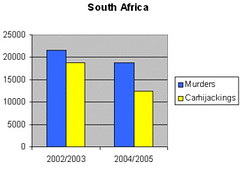South Africans, white and Asian ones in particular - and I have to include myself - do seem to be hysterical about the massive levels of violent crime in the country. But an article online has given me hope.
In the past I have staunchly defended South Africa's crime situation. Stating as an example that my whole family is there and touch wood, nothing has happened to them.
But recently I have come to see the problem as so large and intractable as to threaten the young democracy itself. And the despair is increased by the perception that crime is getting even worse.
Anecdotally it does seem to be the case of late. Apart from all the well publicised murders in recent months, in one month during my last visit my uncle was robbed at gunpoint, my sisters husbands father was severely assaulted (he was commotose for a few days) on his agricultural small holding, a fugitive policeman's car went up in flames in front of me on the highway from Jhb to Bloemfontein and a friend's brother was shot dead in an liquor store in Cape Town. It has been increasingly hard to convince myself that I was just unlucky.
But a very illuminating article in the Mail and Guardian and the comments of Anthony Altbeker, crime expert, researcher linked to the Institute for Security Studies (ISS) in Pretoria and author of The Dirty Work of Democracy: A Year on the Streets with the SAPS, has forced me to put on hold these creaping doubts.
Altbeker says that although most South African crime statistics is unreliable, two, murder and car hijackings, are reliable.
"Police cannot refuse to record a murder for obvious reasons. And then there is also a body to account for." The other concerns car theft and carjacking. "These tend to be well reported for insurance purposes."
This one has to say, makes sense. And here is the good news:
"Both murder and carjacking rates have declined over the past years. Last year's count of carjackings was 12 434, according to the SAPS; in 2002/03 it was 14 691. Murders totaled 18 793 in 2004/05, with 21 553 two years prior to that. The number of reported incidences of murder and attempted murder is considerably lower than just after the birth of democracy in South Africa in 1994."
But the crime has been redistributed. Whitey South Africans undoubtedly now experience more of it. But he says: "If you ask me whether white people are more often the target of crime than 10 years ago, I'd say absolutely... But if you ask me if they are more targeted than five years ago, I'm not so certain. There has been a redistribution of violence after the end of apartheid. But it is not just whiteys that express more fear, it is everybody."
Even now "Murder rates of white people are two-thirds lower than the national average."
The crime levels black South Africans exprerience is astounding, and to read an account of it go here.
Altbeker goes on to say why he thinks crime is falling, one of the reasons being that the generation that grew up during the 80's and early 90's (Township) War is getting older.
"September 1990 went down in the books as the most violent month in South African history. Now, 15 years after that worst apartheid violence, we live in a more stable society where people have learned habits of self-control."
Mmm... and now I feel a bit ashamed for doubting in the South African dream. I was an investigator of the Truth and Recociliation Commission. I investigated a massacre that took place on 4 September 1990. 42 township residents were slaughtered during the night. Most of them by a marauding Zulu militia. Later it turned out their weapons were supplied by the security branch of the police, and the investigation into the killings intentionally botched by the police.
If indeed the gereration of the Township War is partly to blame for South Africa's violence, it is incumbant for us to sit this out and hold our critical fire. We are partly responsible.
Just hope your not one of the unlucky ones. Sphere: Related Content





No comments:
Post a Comment